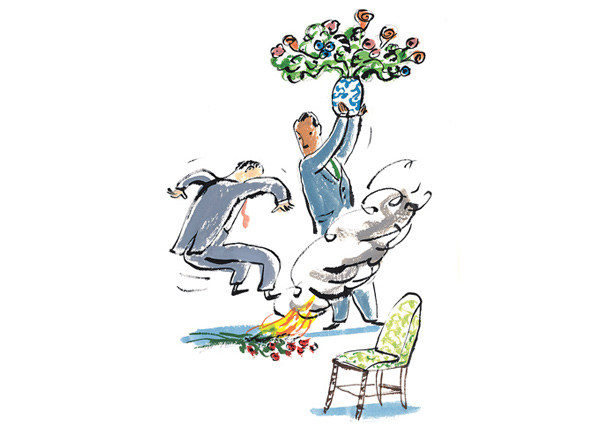For Gourmet Live's 2012 Restaurant Issue, we reprise this timeless account of the magic formula behind one of America's best-loved and most widely lauded restaurants, New York City's Union Square Cafe. The restaurant business is notoriously fickle, but a decade after this article appeared in the October 2002 issue of Gourmet magazine, Union Square Cafe remains a paragon of "enlightened hospitality."
Today, owner Danny Meyer has spun his flagship's success into a nine-restaurant empire—not counting his rapidly growing quality-burger chain, Shake Shack—and a catering company. And, no surprise, he essentially wrote the book on hospitality: Setting the Table, a 2008 New York Times best seller.
Bruce Feiler received a James Beard Award for the article that follows. Today, he is a New York Times columnist and the best-selling author of 12 books. His next, The Secrets of Happy Families: Surprising New Ideas to Bring More Togetherness, Less Chaos, and Greater Joy, is due for publication in February 2013. Since training and working at Union Square Cafe, Feiler gets grumpy in any restaurant, he tells us, "if I'm not greeted when I first sit down or if I'm sitting there more than 30 seconds without a menu, bread, or a drink order." —The Editors
In my first minute on the job, Table 31 caught on fire.
I had arrived at Union Square Cafe just before 4:30 on Saturday afternoon to begin work as a maître d'. "I would like to make a few announcements," said Paul Bolles-Beaven, the managing partner. "As usual, the Greens will be at Table 32. Remember, he likes to be seated immediately, and he didn't like the duck last time. The Dining In, Dining Out reporter from The New York Times will be here. And we misspelled 'Arctic Char' on the menu. If anyone notices, I'll pay for their meal."
At "family meal," the staff samples the night's specials, trades gossip, and reviews the guests. Their information comes, in part, from a new computer program called OpenTable System, a kind of digital know-it-all that allows the restaurant to track the reserving, eating, spending, and attitudinal patterns of every guest. It also notes special occasions, dietary needs, even deaths of longtime lovers.
Table 31 was a special occasion, a woman's 85th birthday. It had been booked for seven, a bottle of Champagne preordered. Flutes were polished and laid in place. A host led the family to the table, at which point a gentleman set a bouquet of flowers down on a candle. Whoosh! The tissue paper ignited and the entire bouquet burst into bright orange flames. The fire quickly reached three feet high, catching the tablecloth and threatening to spread. The guests surged backwards. A cry went up.
For a second, everyone froze, then the manager rushed down the steps into the dining room carrying an ice bucket. A guest dunked the flowers into the unmelted ice, and by then the staff regained its composure, began pulling out chairs, and hurried the party back upstairs. Despite a specific enjoinder in the training manual that states never, ever use a napkin or tablecloth to clean spills on the floor, several staffers smartly used a tablecloth to smolder the remaining flames. Cooks rushed forward with mops.
Meanwhile, the ice bucket with the floral carcass was sitting forlornly in the middle of the floor. "Feel! Think! Act!" I remembered the manager teaching me. I grabbed the bucket and hurried back to the kitchen. Out front, the table was being reset and a modicum of bewildered fascination had settled over the guests. They were having a New York experience.
"Does this happen all the time?" one of the guests asked me.
"I don't know," I said. "This is my first day on the job."
I was there to try and understand the inner workings of what Danny Meyer, who owns Union Square Cafe and four other restaurants, calls "enlightened hospitality." What do you do if you spill soup on a guest? Or if a guest rejects a $300 bottle of wine? I wanted to know if the tenets of elite hospitality would work if you took them away from an elite restaurant-and whether they might help me negotiate the inevitable spilt milk and broken plates in my own daily life.
I began by attending the meeting that Meyer convenes every five weeks for new hires to his 600-person staff. About two dozen employees-most of them decades younger than the 44-year-old Meyer-sat rapt as he told his St. Louis-to-riches story. "We are in business for only one reason," he says. "To create raves for the people with whom we have transactions. If the maître d' says to someone, 'How was everything?' and they say, 'Fine,' that was not a rave."
Meyer is a wiry, wired man with a genial smile and slightly bugged eyes who glides through his restaurants passing out compliments and commands in a manner that is one part shaggy dog, one part sly serpent, one part king of the jungle.
"What I have learned," he says, "is that I have an intense, nearly neurotic interest in seeing people have a good time."
Meyer was born to an arch-Democratic mother and an arch-Republican father, who alternately succeeded and failed as a travel agent and tour operator. Meyer calls himself a classic middle child, as well as an assimilated midwestern Jew. His father helped start a synagogue that was so Reform it held no bar mitzvahs, met on Sundays, and taught primarily ethics and Jewish cooking. He delivered his confirmation speech on the values of interfaith marriage, then married a Catholic.



 Pinterest
Pinterest






